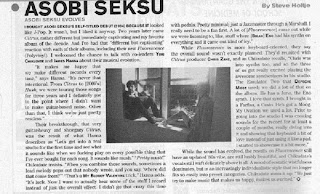Print is not dead...yet.
This is from the current issue of The Big Takeover (#68). Subscribe here! Since the above isn't legible, I figured I'd put the text here. And then I figured I might as well put in the longer version I had to cut down to squeeze into the available space (the section of the magazine this interview ran in IS called Short Takes). So here's my first draft:
Asobi Seksu’s self-titled album was reissued by Friendly Fire in 2004, the year the record store I work at opened. One day I bought a used copy from a customer because I thought it might be interesting J-Pop. It wasn’t, but I liked it anyway. Two years later came Citrus, very different but immediately captivating and my favorite album of the decade. And I’ve had that “different but captivating” reaction with each of their albums, including the new Fluorescence. I welcomed the chance to talk with co-leaders Yuki Chikudate and James Hanna about their musical evolution.
Hanna and Chikudate both went to Manhattan School of Music, respectively studying classical guitar and piano. She remembers, “With this band was the first time I started singing. I’d never been without a piano, and I’d never used my physical body as an instrument before, so I was absolutely terrified. I was a bit shocked that I was pushed to be a singer, because I had no idea what I was doing.”
I mention that on the sole (and very rare) EP of their previous incarnation, Sport Fuck, James was the primary vocalist. “I know, I know,” he says. “I had no choice. Nobody else would sing. It was me or the drummer, and his voice was much worse than mine. The thing I wanna say about Sport Fuck is, I still think of that as another band. It’s just such a different time. ‘Umi de no Jisatsu’ was probably the first song that I consider like this band.” “We were moving in this direction,” Chikudate continues. “At that point, I wasn’t singing really, and ‘Umi de no Jisatsu’ was the last thing we wrote before we recorded that EP.” (Hanna also says, “I used to be ashamed that people would find out we used to be called Sport Fuck. Now it’s kind of funny.” Their current name is just a more polite translation of the old name.)
So the urge for change was already there in the beginning. “It makes me happy that we make different records every time,” says Hanna. “It’s never that intentional. From Citrus to Hush, we were touring those songs for three years and I definitely got to the point where I didn’t want to make guitar-based noise. Other than that, I think we’re just pretty restless.”
Of course, their breakthrough, the very guitar-heavy and shoegazy Citrus, led to inevitable comparisons to My Bloody Valentine. Did that influence the desire to change styles? “No, no, no,” they both exclaim. Chikudate explains, “We just try to make music that makes us happy, what makes us excited. I guess that’s probably why there have been some changes.” Hanna says, “I really need to be a fan first. A lot of this comes out while we’re listening to, like, stuff where Eno had his synths on everything and it came out kind of icy.”
While Fluorescence is more keyboard-oriented, they say the overall sound wasn’t exactly planned. They’d reunited with Citrus producer Chris Zane, and as Chikudate recalls, “Chris was into synths too, and so the three of us got really excited playing the really awesome synthesizers in his studio. The Emulator Two that Depeche Mode used, we did a lot of that on the album. He has a Juno, the Eno synth. I love that synth. I brought in a Farfisa, a Casio. He’s got a Moog. My Ovation we used a lot. Prior to going into the studio I was creating sounds for the record for a least a couple of months, really diving into it and showing that keyboard a bit of love instead of just using it like a pad. I started to really showcase it a bit more. There aren’t as many guitar tracks this time.”
“I didn’t go that crazy this time with pedals,” Hanna concurs. “Pretty minimal, just a Jazzmaster through a Marshall.”
That’s unlike the process through which Citrus was recorded, which Hanna describes as “Let’s get into a real studio for the first time and see what it sounds like when we fucking play on every possible thing that I’ve ever bought for each song. It sounds like mush.” “Pretty mush!” Chikudate insists. “When you combine those sounds, sometimes a lead melody pops out that nobody wrote, and you say, ‘where did that come from?’” “That’s a My Bloody Valentine trick,” Hanna adds. “It’s luck. Now I want to actually hear some of the stuff I record instead of just the overall effect. There’s still a little bit of that [mush], it’s an overall balance, how everything combines when you can’t tell what’s going on, and how they sound separately.”
While the sound has evolved, the results on Fluorescence still have an updated '80s vibe, the songs are still lushly beautiful, and Chikudate’s vocals still waft delicately above it all. A mood of ecstatic wistfulness still dominates, but in an increasingly individualistic style that no longer fits so easily into preset categories.

No comments:
Post a Comment